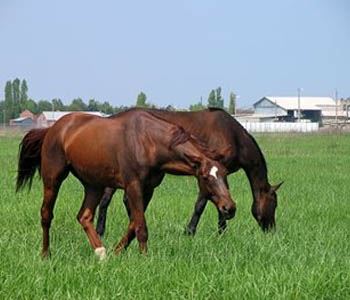Ideas for Decreasing Heat Stress in Horses
Jul 17, 2019

As summer drags on, heat can become a serious problem for many horses.
The primary way horses cool themselves is through sweating. While the exact mechanisms for inducing sweat production in horses are not yet fully understood, some experts believe that prolonged, consistently high sweat rates can lead to a kind of “exhaustion” of the sweat glands in horses which may result in anhidrosis (the inability to produce sweat adequately). Recommendations to help address anhidrosis center on finding ways to keep horses cooler, decreasing the need for sweat production.How to decrease heat stress in horses
Here are a few ideas you may want to try to keep your horses cooler this summer.Adjust feeding management
At rest, body heat is produced primarily by microbes in the hindgut digesting the forage a horse eats. Try providing the bulk of the horses’ daily ration overnight. Ration out smaller quantities of hay during the day and give them the largest portion for overnight consumption. Feed concentrates later in the evening and early in the morning as well.
Reduce stress/postpone procedures
In order to avoid additional movement, excitement and/or stress, postpone events such as vaccination, deworming, weaning, changing barns, moving horses between groups etc. If any of these events must occur during the hottest days of summer, try to get them accomplished during the coolest hours of the day.
Provide shade
This one is just common sense, as we can all appreciate how much cooler it is under the shade tree in the middle of summer versus being out in the full sun. Your horse feels the same way. If you don’t have trees in your turnout areas, providing a run in shed or even a fabric sunscreen can really make a big difference in helping to keep your horses cool.Provide sprinklers, baths and fans
Because horses cool themselves primarily through evaporative and convective cooling, applying cool baths or using sprinklers in pastures/dry lots may help keep your horses more comfortable and decrease their need to sweat as much. Moving air increases both convective and evaporative cooling. So if the breeze isn’t blowing, provide a fan to move the air. Some farms even use large golf course fans to keep their horses cool in pastures.
Exercise in the evening or morning
Monitor water intake
----Purina Animal Nutrition